|
| NEWS |
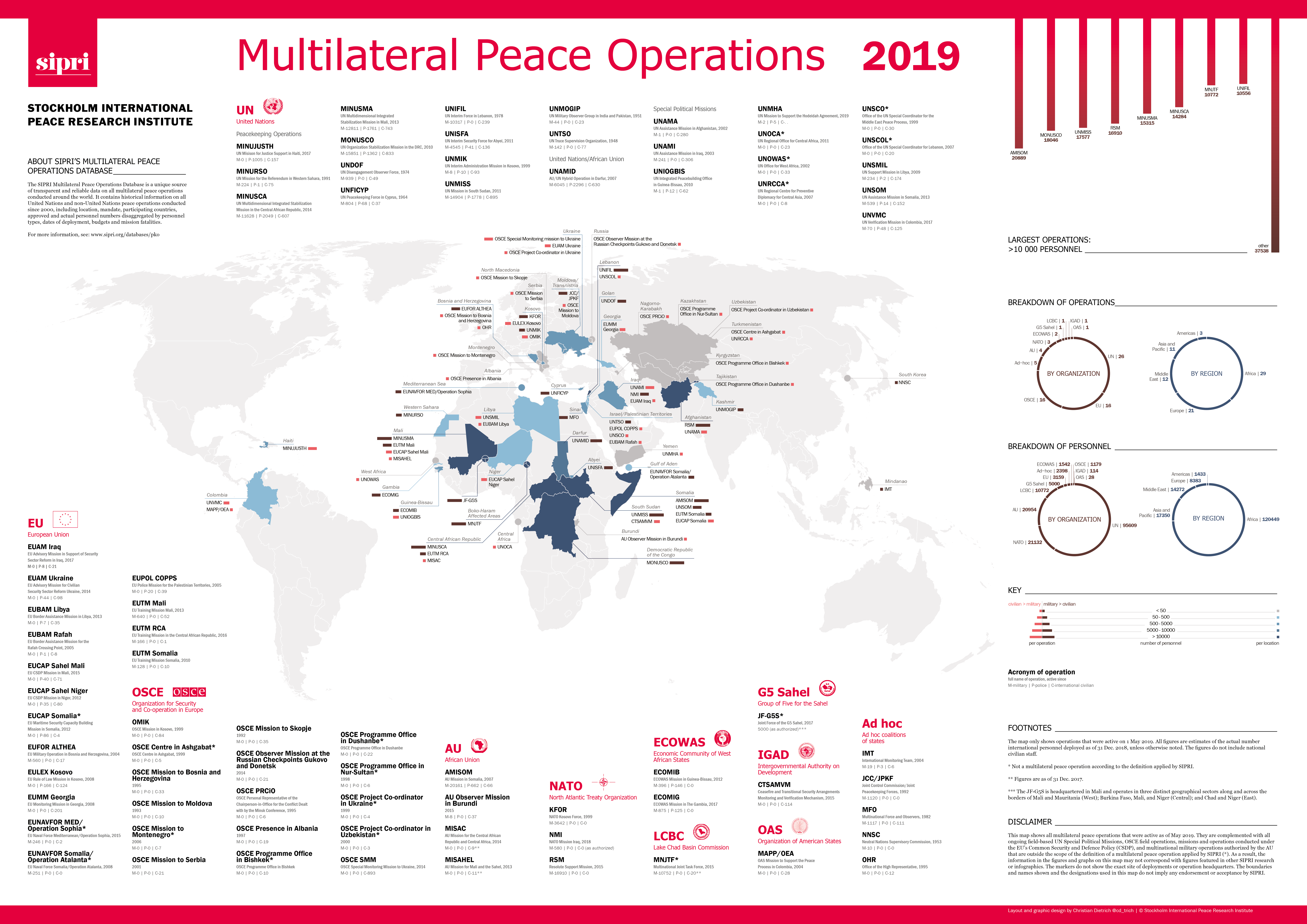 |
| New SIPRI data on multilateral peace operations |
| To commemorate the International Day of United Nations Peacekeepers (29 May), SIPRI has released new data on multilateral peace operations. A topical backgrounder summarizes the main findings of the data which covers the decade 2009–18 and a new map illustrates all active multilateral peace operations as of May 2019. |
|
|
Read the Topical Backgrounder | Download the SIPRI map of multilateral peace operations in 2019
|
|
|
|
|
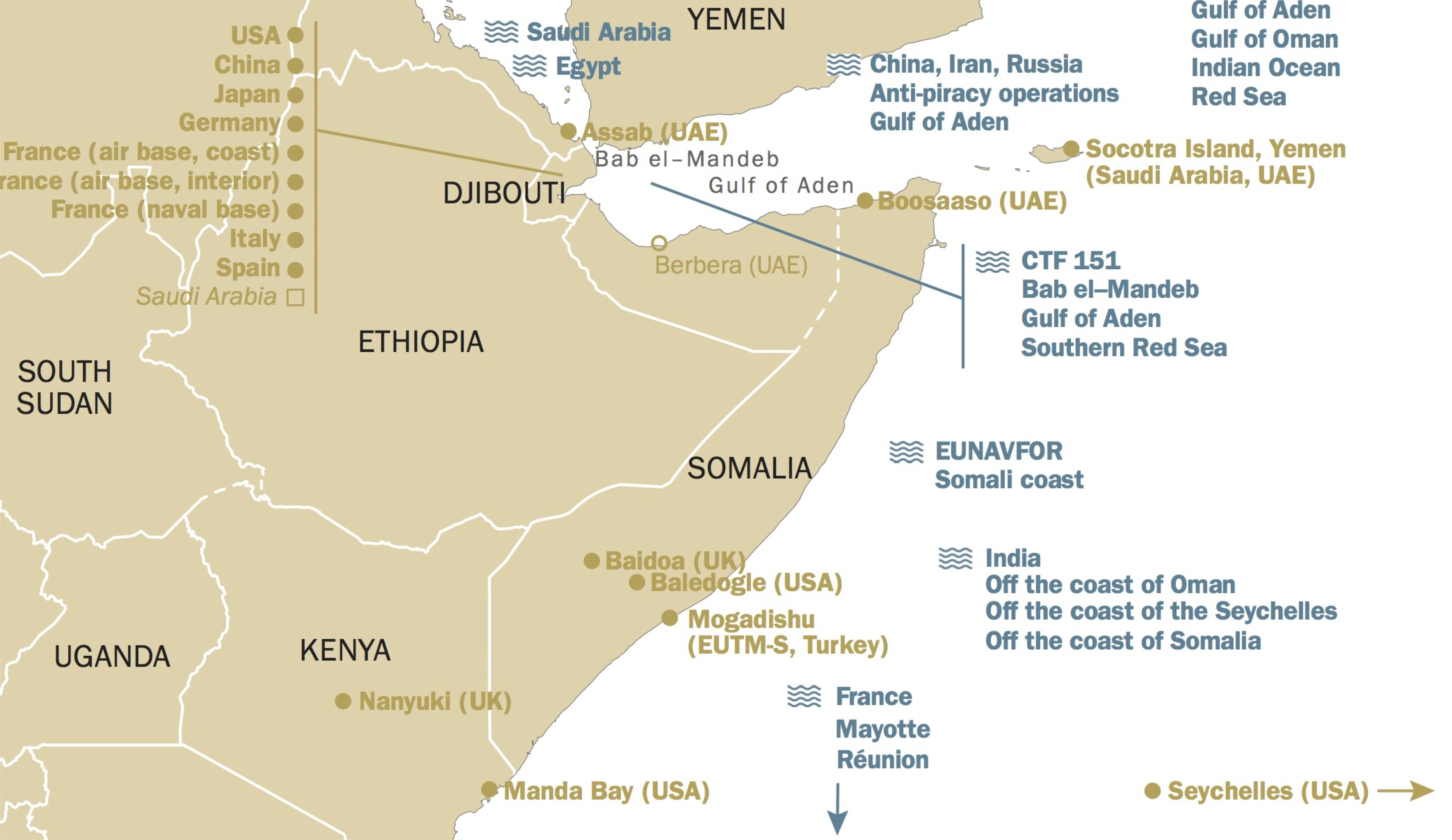 |
| SIPRI launches reports on the new external security politics of the Horn of Africa region |
| SIPRI has expanded its research on security issues in the Horn of Africa region by launching a series of publications. Notably, the new research highlights the increasing importance of geopolitical, commercial and military competition as the driver of foreign military deployments to the region. |
|
|
Read more
|
|
|
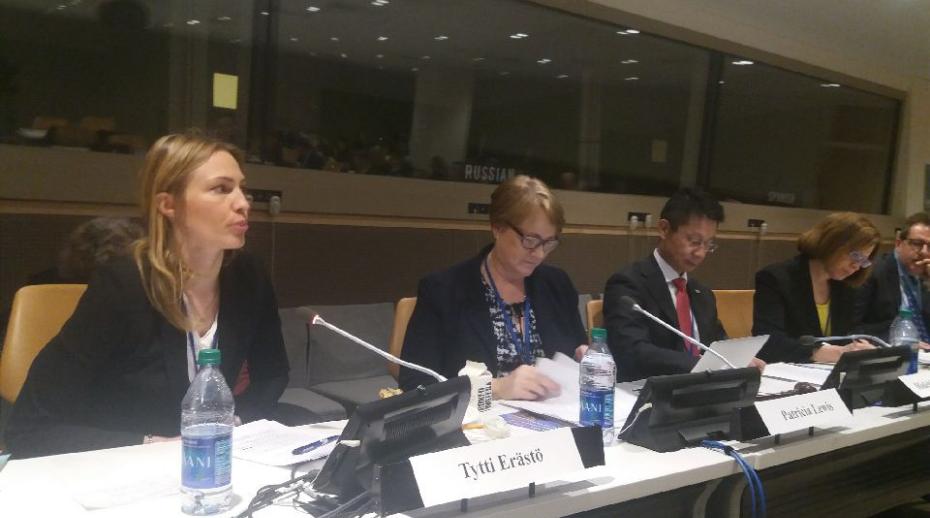 |
| SIPRI presents new reports at the Non-Proliferation Treaty PrepCom in New York |
| SIPRI showcased two new reports at the Preparatory Committee for the 2020 Non-Proliferation Treaty Review Conference (PrepCom), held at the United Nations in New York on 29 April–10 May 2019. The first report covers the impact of artificial intelligence on strategic stability and nuclear risk; the second report reviews the operationalization of nuclear disarmament verification. |
|
Read more
|
|
|
|
| COMMENTARY |
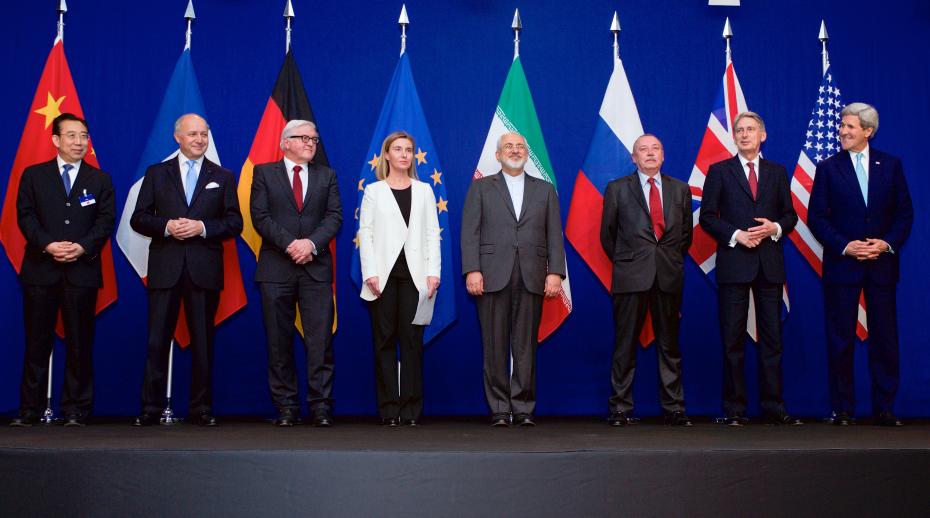 |
| The US withdrawal from the Iran deal: One year on |
| This SIPRI Expert Comment examines the withdrawal of the United States from the Joint Comprehensive Plan of Action (JCPOA). One year after the decision was taken, no evidence-based technical objection to the JCPOA or its implementation has been produced. Moreover, the piece argues that the decision undermines global nuclear non-proliferation efforts and risks seriously weakening trust and confidence in the global security architecture. |
|
Read the SIPRI Expert Comment
|
|
|
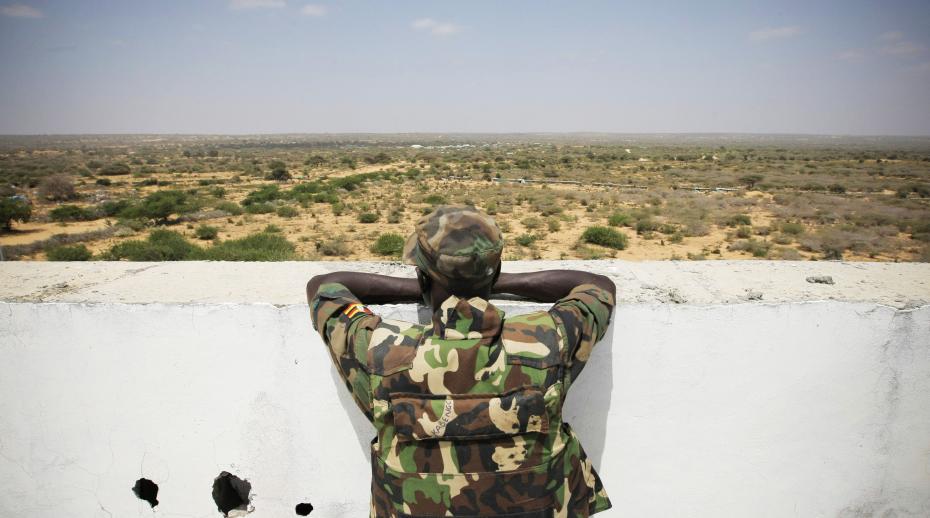 |
| Rethinking stabilization efforts in Somalia |
| The implementation of stabilization policies rests on a delicate balance between building a coherent long-term peace strategy and having a clear exit strategy. In this WritePeace blog, Somalia is used as a case study to ask why—despite international support—stabilization is so far away? Further, what lessons can be learnt from Somalia for international stabilization efforts? This blog was authored by one of the partners for the 2019 Stockholm Forum on Peace and Development. |
|
Read the SIPRI WritePeace blog
|
|
|
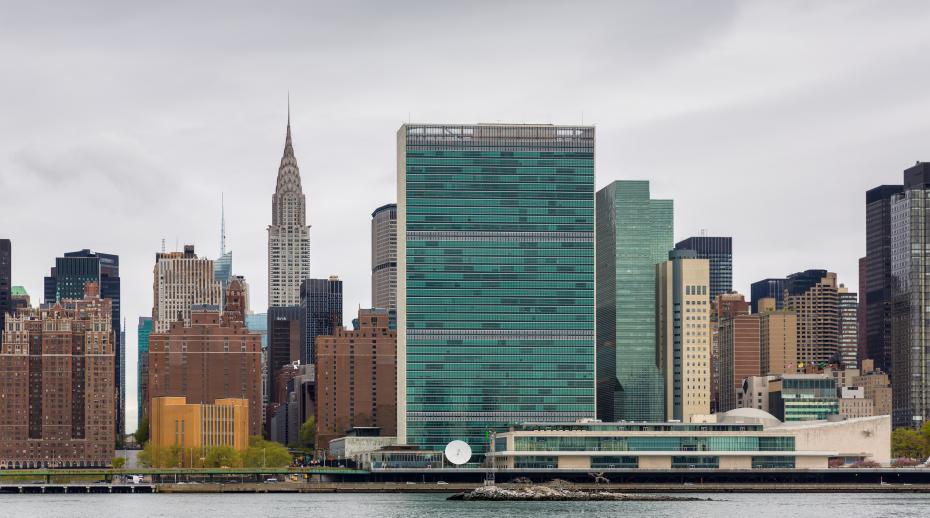 |
| Fifty years of the NPT—cause for celebration or commemoration? |
| The year 2020 will mark 50 years since the Nuclear Non-Proliferation Treaty (NPT) entered into force. As indicated during discussions at the Preparatory Committee for the 2020 NPT Review Conference (PrepCom)—held on 29 April–10 May 2019—it may not be a happy anniversary. Despite their ritualistic affirmations that the NPT is the cornerstone of the global nuclear order, states parties remain divided on substantive issues. |
|
Read the SIPRI WritePeace blog
|
|
|
|
| UPCOMING EVENTS |
| |
| 2 July 2019 |
| Almedalen: SIPRI partners with the World Food Programme to discuss hunger and conflict in Mali |
| SIPRI is pleased to announce its participation at the 2019 Almedalen Week in Visby, Gotland. This year, SIPRI will host a panel discussion in cooperation with the World Food Programme (WFP) about the link between hunger and conflict in Mali. Drawing from a recent case study conducted on Mali, the panel will discuss how hunger affects the conflicts in Mali and will investigate if it is possible to build sustainable peace without securing access to food. |
|
Read more
|
|
|
| RECENT EVENTS |
| |
| 27 May 2019 |
| 2019 SIPRI Lecture |
| The SIPRI Lecture is an annual event in Stockholm on topics related to international peace and security. This year it was held on the theme, ‘Peace, development, human rights and gender equality—The story of my life’, honouring HE Michelle Bachelet, the United Nations High Commissioner for Human Rights and former President of Chile. The lecture was followed by a distinguished panel discussion, closing remarks from HE Margot Wallström, Sweden’s Minister for Foreign Affairs, and also featured piano performances by Professor Staffan Scheja. |
|
Read more | Watch the event | Watch the SIPRI Spotlight interview
|
|
| |
| 22–23 May 2019 |
| SIPRI and partners convene regional dialogue on climate security in the Horn of Africa |
| SIPRI in cooperation with the Friedrich-Ebert-Stiftung Kenya Office (FES Kenya) and the Pan African Climate Justice Alliance (PACJA) convened a two-day workshop in Nairobi, Kenya. The workshop sought out ways for better integrating the risks posed by climate change into peace and security processes in the Horn of Africa region. |
|
Read more
|
|
| |
| 8 May 2019 |
| SIPRI hosts former Minister of Foreign Affairs for Kuwait |
| SIPRI hosted His Excellency Sheikh Mohammad Sabah Al-Salem Al-Sabah, Former Deputy Prime Minister and Minister of Foreign Affairs for Kuwait, for an expert roundtable discussion. The discussion focused on developments, challenges and opportunities in the Gulf region. |
|
Read more | Watch the SIPRI Spotlight interview
|
|
| |
| 6 May 2019 |
| SIPRI co-hosts an event on global arms transfers and military spending in Washington, DC |
| SIPRI, in partnership with the Stimson Center held an event presenting and analyzing the latest trends in global arms transfers and military expenditure. The event took place at the Stimson Center’s headquarters in Washington, DC, and featured Dr Aude Fleurant, Director of the SIPRI Arms and Military Expenditure Programme. |
|
Read more | Watch the event
|
|
| |
| 6 May 2019 |
| SIPRI hosts visit from NATO Parliamentary Assembly |
|
SIPRI hosted a delegation from the North Atlantic Treaty Organization Parliamentary Assembly (NATO PA). During their visit, SIPRI convened a range of thematic expert discussions on topics such as climate change and risk; the future of arms control; and the security environment in the High North.
|
|
Read more
|
|
|
| JOB VACANCIES |
| |
| Two current openings |
|
SIPRI is currently recruiting for two positions:
- Project Controller, Financial Department;
- Research Assistant, Peace Operations and Conflict Management Programme.
|
|
Read more
|
|
|
| PUBLICATIONS |
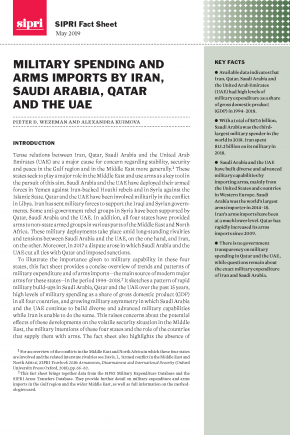 |
| Military spending and arms imports by Iran, Saudi Arabia, Qatar and the UAE |
| Tense relations between Iran, Qatar, Saudi Arabia and the United Arab Emirates (UAE) are a major cause for concern regarding stability, security and peace in the Gulf region and in the Middle East more generally. These states seek to play a major role in the Middle East and use arms as a key tool in the pursuit of this aim. To illustrate the importance given to military capability in these four states, this SIPRI Fact Sheet provides a concise overview of trends and patterns of military expenditure and of arms imports—the main source of modern major arms for these states—in the period 1994–2018. |
|
Read the publication
|
|
|
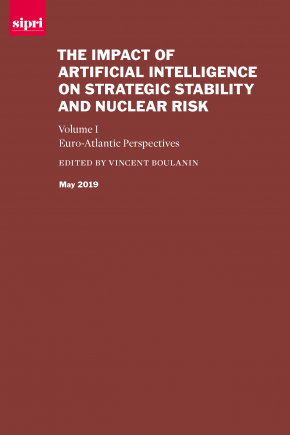 |
| The Impact of Artificial Intelligence on Strategic Stability and Nuclear Risk |
| This report is the first instalment in a trilogy that explores regional perspectives and trends related to the impact that recent advances in artificial intelligence (AI) could have on nuclear weapons and doctrines strategic stability and nuclear risk. The second and third instalments will cover East Asia and South Asia. A final report, informed by the findings of the three regional reports, will be launched later in 2019. |
|
Read the publication
|
|
|
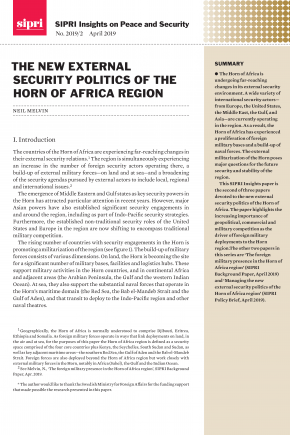 |
| The New External Security Politics of the Horn of Africa region |
| SIPRI has expanded its research on security issues in the Horn of Africa (HoA) region by launching a new series of publications investigating major questions for the future security and stability of the region. The series of publications includes a SIPRI Background Paper that maps the growth of foreign military forces in and around the HoA over the past two decades; a SIPRI Insights paper that explores the factors driving foreign military deployments to the region; and a SIPRI Policy Brief that identifies priority areas for action to help HoA countries in managing the new external security politics of the region. |
|
SIPRI Background Paper | SIPRI Insights paper | SIPRI Policy Brief
|
|
|
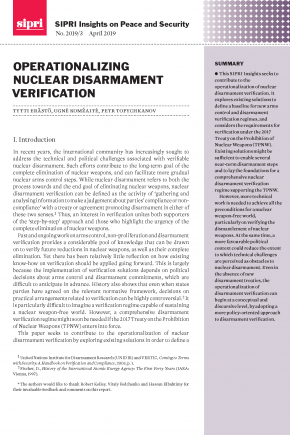 |
| Operationalizing nuclear disarmament verification |
| This SIPRI Insights paper seeks to contribute to the operationalization of nuclear disarmament verification. It explores existing solutions to define a baseline for new arms control and disarmament verification regimes, and considers the requirements for verification under the 2017 Treaty on the Prohibition of Nuclear Weapons (TPNW). Existing solutions might be sufficient to enable several near-term disarmament steps and to lay the foundations for a comprehensive nuclear disarmament verification regime supporting the TPNW. |
|
Read the publication
|
|
|
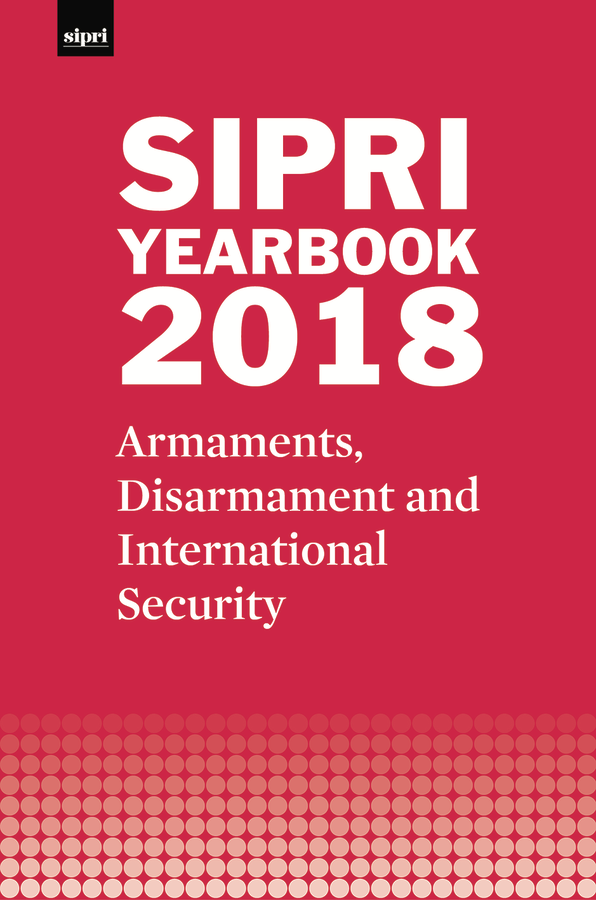 |
| SIPRI Yearbook 2018 |
The 49th edition of the SIPRI Yearbook is a compendium of data and analysis in the areas of security and conflicts; military spending and armaments; and non-proliferation, arms control and disarmament. It also features sections on:
- debt, oil price and military expenditure;
- international non-proliferation sanctions against North Korea; and
- allegations of chemical weapons in Iraq and Syria.
|
|
Browse the contents page | Read the summary [PDF]
|
|
|
| |